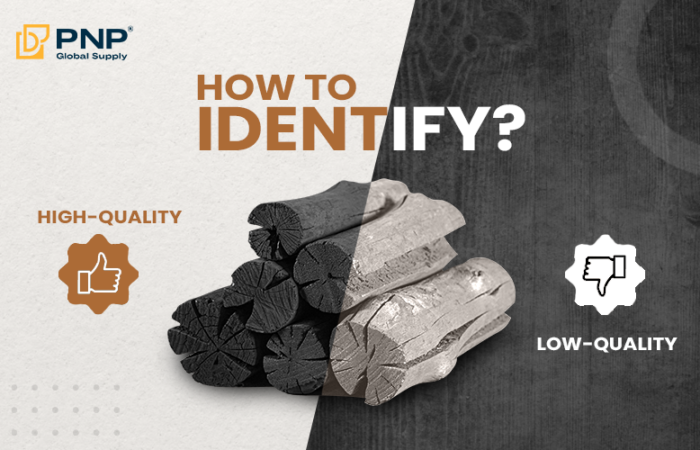PNP Charcoal offers the perfect BBQ solution with two distinctive types of charcoal: Lump Charcoal and briquettes. Lump Charcoal, a natural unadulterated charcoal, stands out for its distinctive woody flavor, high burning temperature and minimal ash, suitable for quick grilling, creating a crispy outer layer. Meanwhile, briquettes providing a steady and long-lasting burn, ideal for long barbecue parties. Discover the advantages of each type and find the optimal solution for your grilling style with PNP Charcoal – a prestigious brand for quality and sustainability.
What is Lump Charcoal?
Definition and Features
Lump charcoal is the purest form of charcoal, made by burning hardwood – Khaya charcoal, eucalyptus charcoal, coffee charcoal, longan charcoal – in a low-oxygen environment through a process called pyrolysis. The result is, natural chunks of carbonized wood with no additives or binders. Often referred to as “natural charcoal,” lump charcoal retains the essence of its source material, making it a favorite among purists.
Its standout features include a high carbon content (up to 80-90%), minimal ash production, and a rustic, uneven appearance. Unlike processed alternatives, lump charcoal is free from chemicals, fillers, or artificial flavorings, offering a clean-burning fuel source for grilling.
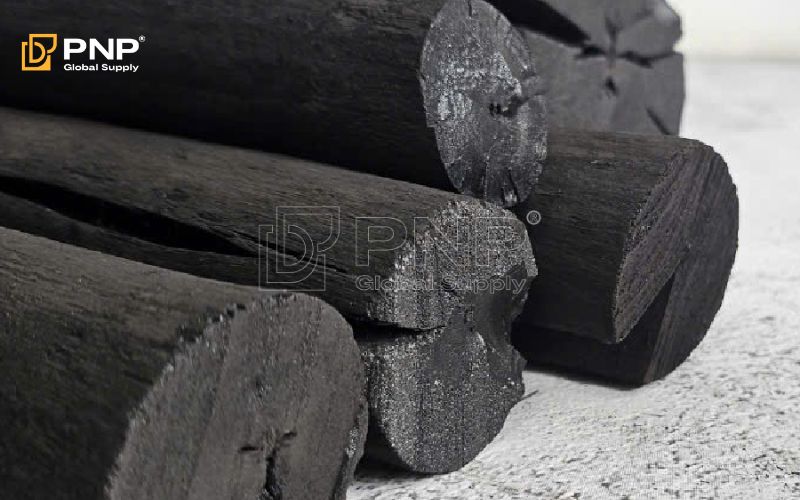
Burning Style and Heat
Lump charcoal burns hot and fast, reaching temperatures of 700°C – 900°C or more, depending on airflow and the wood type. It ignites quickly-often within 10-15 minutes with a chimney starter-and produces a bright, lively flame. However, its burn time is shorter than briquettes, typically lasting 30-60 minutes at peak heat before tapering off.
The heat output is less consistent due to the irregular shapes and sizes of the pieces, which can create hotspots. This makes lump charcoal ideal for cooks who value intensity over uniformity.
Best Applications
Lump charcoal shines in scenarios requiring high heat and authentic flavor:
- Searing: Perfect for steaks, burgers, or anything needing a quick, intense char.
- Smoking: Adds a robust, woody taste to meats when paired with wood chips.
- Artisanal Cooking: Preferred by grill masters who want a natural, hands-on experience.
If you’re asking, lump vs briquettes, lump charcoal is the go-to for those prioritizing flavor and a chemical-free burn.
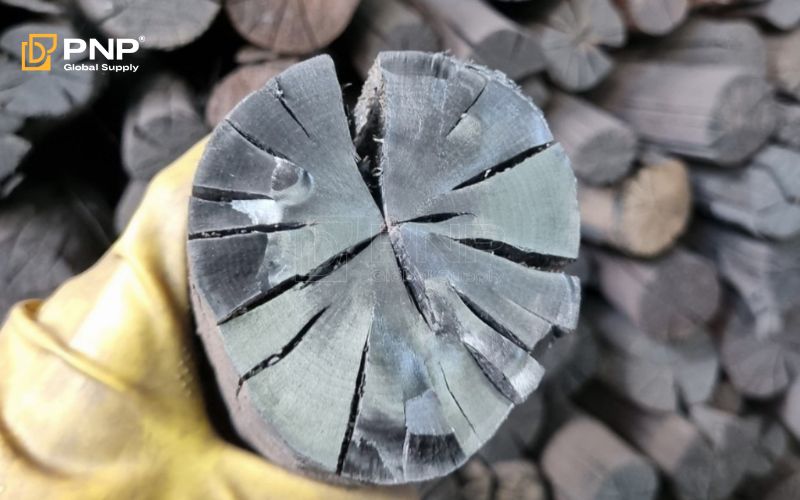
What are Charcoal Briquettes?
Definition and Features
Charcoal briquettes are uniform, pillow-shaped blocks made from compressed coconut shells, sawdust, and additives. Invented in the early 20th century by Orin Stafford, lump charcoal was created to ensure consistency and affordability by utilizing scrap wood. Today, lump charcoal has become a familiar item in the backyards of millions of families around the world.
Briquettes often contain fillers to improve burning or ash color (e.g., sodium nitrate for ignition, limestone for white ash), though premium brands minimize additives. Their uniform shape ensures predictable performance, making them a convenient choice for casual grillers.
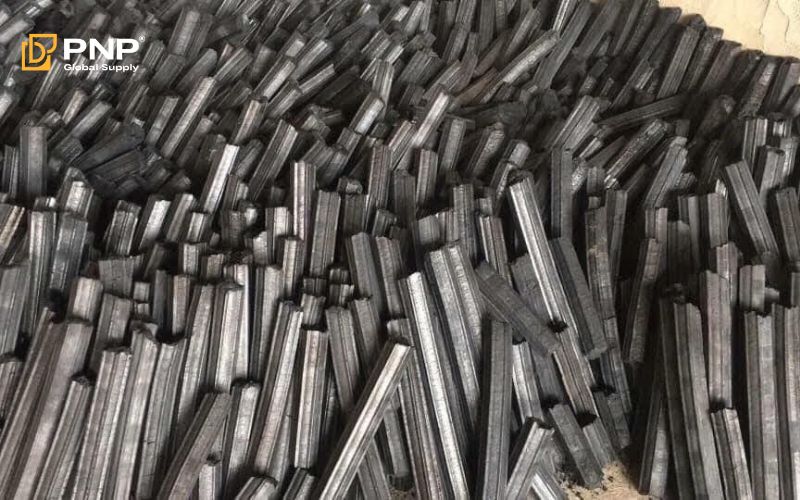
Burning Style and Heat
Briquettes burn slower and cooler than lump charcoal, typically reaching 700-800°F (370-426°C). They take longer to ignite—about 20-30 minutes—but offer a steady, even heat that can last 2-7 hours or more, depending on size and quality. This controlled burn comes from their dense composition and uniform structure, which restricts airflow compared to lump charcoal’s open, porous chunks.
The trade-off? Briquettes may produce more ash and, in some cases, a faint chemical smell from additives, though high-quality options mitigate this.
Best Applications
When it comes to grilling and cooking, charcoal briquettes shine in scenarios where steady performance outranks raw intensity. Unlike lump charcoal, briquettes are engineered for uniformity, making them the go-to choice for specific applications. Here’s where they truly excel:
- Low-and-Slow Cooking: Perfect for smoking brisket, ribs, or pork shoulder, briquettes deliver a consistent, controlled heat over hours, ensuring tender, flavorful results.
- Large Gatherings: Their long burn time makes them ideal for extended grilling sessions, keeping the fire going without constant refueling.
- Beginner-Friendly Grilling: Easy to light and manage, they’re a stress-free option for novices stepping into the world of BBQ.
When debating briquette vs lump, briquettes are the practical pick for steady, no-fuss performance.
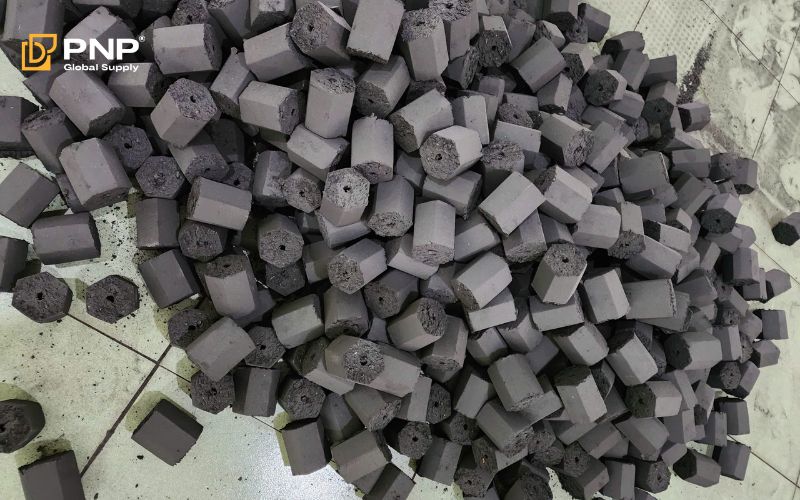
Detailed Comparison of Lump Charcoal and Briquettes
Let’s dive deeper into the lump charcoal vs briquettes showdown with a side-by-side analysis:
Natural vs. Artificial
- Lump Charcoal: 100% natural, made solely from hardwood with no additives. Its purity appeals to eco-conscious cooks and those avoiding synthetic flavors.
- Briquettes: Partially artificial due to binders and fillers. While premium briquettes (e.g., those from coconut shells or sawdust) reduce additives, standard versions may include coal or chemicals, affecting taste and emissions.
Winner? Lump charcoal for purity, but high-quality briquettes narrow the gap.
Heat and Burning Time
- Lump Charcoal: Burns hotter (700°C – 900°C) and faster, perfect for quick, high-heat cooks. Burn time is shorter (30-60 minutes at peak).
- Briquettes: Burns cooler (300°C – 500°C) but longer (2-7+ hours), suited for sustained heat. Heat is more consistent due to uniform shape.
Winner? Depends on your need-lump for speed, briquettes for endurance.
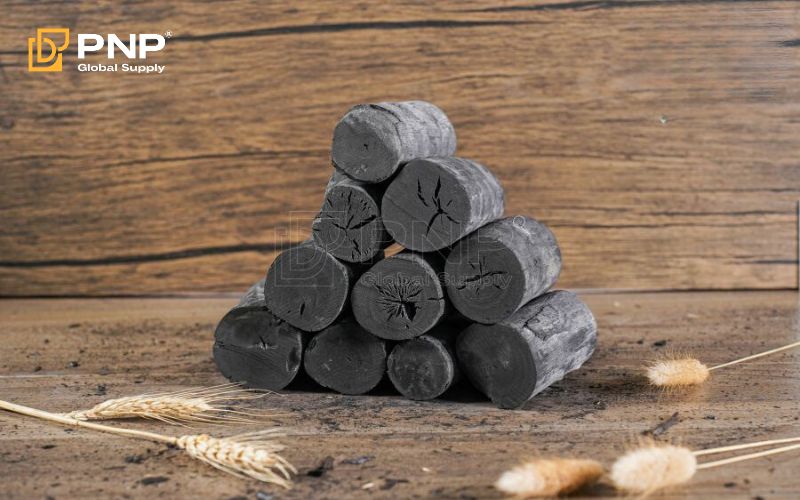
Effects on Food Flavor
- Lump Charcoal: Imparts a clean, smoky flavor tied to the wood source (kaya charcoal and mangrove charcoal). No chemical aftertaste.
- Briquettes: Offers a milder flavor, sometimes with a slight chemical note from additives in cheaper brands. Premium briquettes can mimic lump’s smokiness.
Winner? Lump charcoal for authentic taste, though quality briquettes compete.
Ease of Use and Convenience
- Lump Charcoal: Harder to control due to irregular sizes and rapid burn. Requires skill to manage hotspots and refueling.
- Briquettes: User-friendly with predictable heat and easy stacking. Lights uniformly, ideal for beginners or casual grillers.
Winner? Briquettes for simplicity.
Which Charcoal Should You Choose for Your Grilling Purposes?
The briquette or lump charcoal decision hinges on your grilling priorities. Here’s how to choose:
By Grilling Style
- High-Heat Grilling: Lump charcoal is unmatched for searing steaks, burgers, or kebabs with a crispy exterior.
- Low-and-Slow Smoking: Briquettes excel at maintaining steady heat for hours, perfect for ribs or pulled pork.
- Versatile Cooking: If you switch between styles, consider a mix—lump for searing, briquettes for longer cooks.
By Desired Flavor
- Bold, Natural Smoke: Lump charcoal delivers a rich, wood-fired taste that enhances meats and vegetables.
- Neutral or Mild Flavor: Briquettes provide a subtler profile, letting marinades or rubs shine without overpowering.
By Convenience
- Quick Setup: Lump charcoal lights fast for spontaneous grilling sessions.
- Set-and-Forget: Briquettes offer hands-off reliability for busy hosts or multi-hour cooks.
Still torn? Experiment with both to find your sweet spot—many grillers keep lump and briquettes on hand for different occasions.
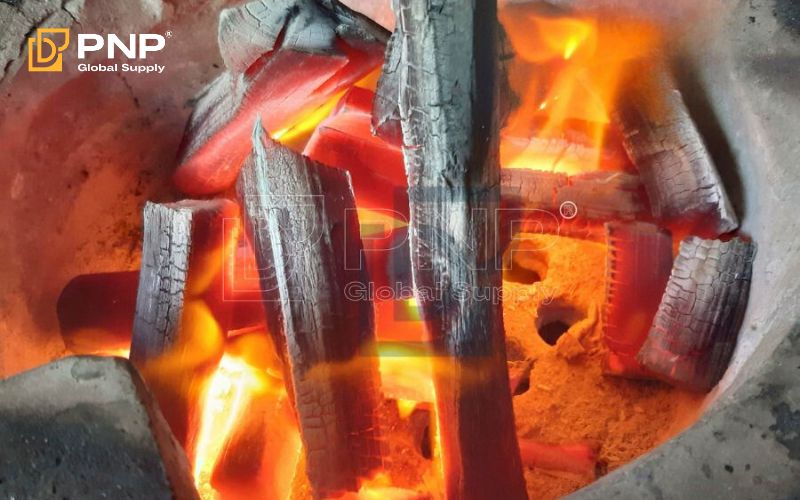
Other Important Factors to Consider
Beyond the basics, these factors can tip the scales in the lump coal vs charcoal (or briquette) debate:
Smoke and Ash
- Lump Charcoal: Produces minimal ash and light, clean smoke—ideal for flavor without mess. Less residue means easier cleanup.
- Briquettes: Generates more ash due to additives and denser composition. Smoke can be thicker, especially with low-quality brands, potentially affecting food taste.
Takeaway: Lump wins for less cleanup, but premium briquettes reduce ash concerns.
Cost and Economic Efficiency
- Lump Charcoal: Cheaper and widely available, offering better value for occasional grilling or large groups.
- Briquettes: More expensive per bag, reflecting its natural yield. Best for occasional, high-quality cooks
Takeaway: Briquettes are budget-friendly; lump is a premium investment.
Environmental Impact
- Lump Charcoal: More sustainable when sourced from fast-growing woods like mangrove or responsibly managed forests. Minimal processing reduces its carbon footprint.
- Briquettes: Higher environmental cost due to additives and energy-intensive manufacturing. However, eco-friendly options (e.g., coconut or bamboo briquettes) improve their profile.
Takeaway: Lump edges out for sustainability, especially from green suppliers like PNP Charcoal.
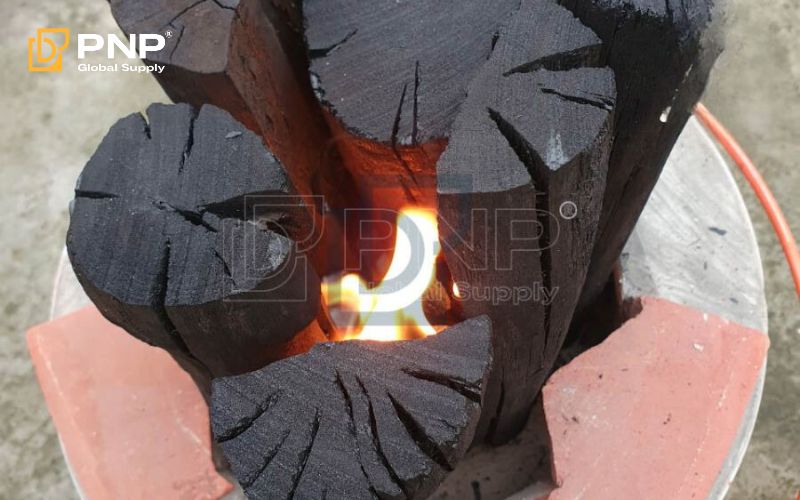
Discover Premium Charcoal from PNP Charcoal
Elevate your grilling experience with PNP Charcoal, your trusted source for premium lump charcoal and high-quality briquettes. Our charcoal is responsibly sourced from hardwoods, delivering exceptional performance with a focus on sustainability. Whether you crave the bold, smoky flavors of clean-burning lump charcoal or the steady, reliable heat of briquettes, PNP has the perfect solution for every BBQ enthusiast.
Why choose PNP?
- Eco-Friendly: Sustainable sourcing reduces your environmental footprint.
- Versatile Options: From lump charcoal for purists to briquettes for convenience, we cater to all grilling styles.
- Unmatched Quality: Rigorous standards guarantee superior burn, low ash, and authentic taste.
Ready to transform your next cookout? Discover why PNP Charcoal is the choice for grillers who demand the best.
Frequently Asked Questions About Lump Charcoal vs Briquettes
1. Can I Mix Lump Charcoal and Briquettes Together?
Yes! Mixing lump charcoal and briquettes combines the best of both worlds-lump’s high heat and flavor with briquettes’ longevity and consistency. Start with lump for a quick ignition, then add briquettes for sustained cooking. Experiment with ratios to match your recipe.
2. Is Lump Charcoal the Same as Lump Coal?
No, lump coal vs charcoal is a common mix-up. Lump coal is raw, unprocessed coal from mines-a fossil fuel with higher emissions and a different burn profile. Lump charcoal is carbonized wood, cleaner and tailored for grilling. Stick to charcoal for BBQ; coal is for industrial use.
3. Which is Better for Beginners-Lump or Briquettes?
Briquettes are better for beginners due to their ease of use, uniform burn, and predictable heat. Lump charcoal requires more skill to manage its rapid burn and hotspots, making it trickier for novices. Start with briquettes, then graduate to lump as you gain confidence.



